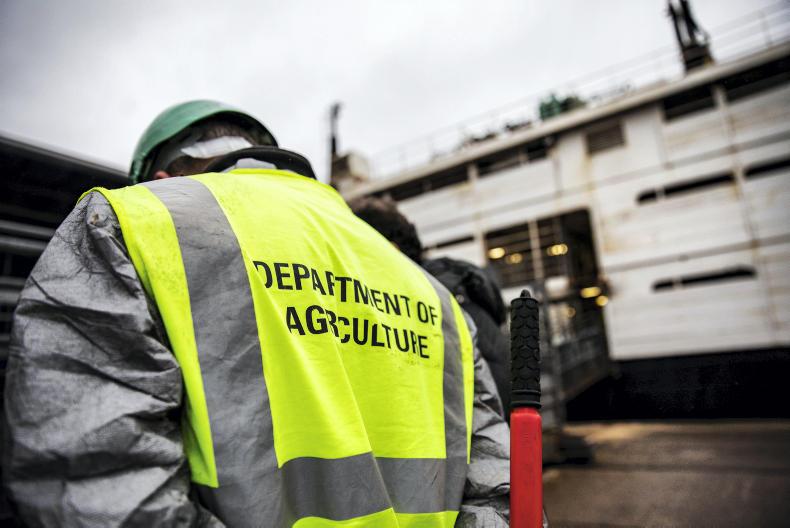The Department of Agriculture has launched a campaign to hire vets for border inspection post duty. This is part of Ireland’s Brexit contingency planning.
The Department is also redeploying existing staff.
Evolving patterns
“It is envisaged that successful veterinary practitioners engaged under this process may be deployed at Dublin and Rosslare Ports, should the need arise,” a statement from Ag House reads.
“Depending on evolving import and export patterns, there may be potential for engagement at further border inspection posts in the future, for example at Shannon or elsewhere.”
Arrangements such as this will afford the Department the appropriate flexibility and latitude in addressing the situation as it evolves
Successful applicants will be engaged on a contracted basis in four- or eight-hour shift patterns up to a maximum of 40 hours per week for a predetermined period.
They’ll be paid €42.99/hr, which is what locum vets for the Department are paid when they are drafted in.
Interested vets are asked to apply through the State procurement website etenders.ie.
“Everyone in Government and beyond would wish that no-deal Brexit plans and contingencies remain on the shelf.
"It is appropriate however that solutions are put in place that can address all potential contingencies,” the Department said.
“In that respect, arrangements such as this will afford the Department the appropriate flexibility and latitude in addressing the situation as it evolves, taking both the specific situation that prevails and value for money into account.”
Qualification
Applicants must hold a veterinary qualification (MVB/ MRCVS) or hold a qualification which will be acceptable as being equivalent, and must be registered or be eligible for registration with the Veterinary Council of Ireland.
There will be inspection posts at Dublin Port, Dublin Airport, Shannon Airport and Rosslare Port.
Contractors will be required to attend on a shift basis that will include out of hours and weekend work. Contract terms will vary on a contract by contract basis.
Reports circulating this week suggest that Brexit may be delayed by up to two years. British Prime Minister Theresa May has delayed the UK parliament's vote on the Brexit deal to 12 March. EU and UK leaders have said over the past week that an extension of the withdrawal date would be a possibility.
Read more
UK plans for agri trade after Brexit disastrous for Ireland
Seed companies stockpiling supplies ahead of Brexit
The Department of Agriculture has launched a campaign to hire vets for border inspection post duty. This is part of Ireland’s Brexit contingency planning.
The Department is also redeploying existing staff.
Evolving patterns
“It is envisaged that successful veterinary practitioners engaged under this process may be deployed at Dublin and Rosslare Ports, should the need arise,” a statement from Ag House reads.
“Depending on evolving import and export patterns, there may be potential for engagement at further border inspection posts in the future, for example at Shannon or elsewhere.”
Arrangements such as this will afford the Department the appropriate flexibility and latitude in addressing the situation as it evolves
Successful applicants will be engaged on a contracted basis in four- or eight-hour shift patterns up to a maximum of 40 hours per week for a predetermined period.
They’ll be paid €42.99/hr, which is what locum vets for the Department are paid when they are drafted in.
Interested vets are asked to apply through the State procurement website etenders.ie.
“Everyone in Government and beyond would wish that no-deal Brexit plans and contingencies remain on the shelf.
"It is appropriate however that solutions are put in place that can address all potential contingencies,” the Department said.
“In that respect, arrangements such as this will afford the Department the appropriate flexibility and latitude in addressing the situation as it evolves, taking both the specific situation that prevails and value for money into account.”
Qualification
Applicants must hold a veterinary qualification (MVB/ MRCVS) or hold a qualification which will be acceptable as being equivalent, and must be registered or be eligible for registration with the Veterinary Council of Ireland.
There will be inspection posts at Dublin Port, Dublin Airport, Shannon Airport and Rosslare Port.
Contractors will be required to attend on a shift basis that will include out of hours and weekend work. Contract terms will vary on a contract by contract basis.
Reports circulating this week suggest that Brexit may be delayed by up to two years. British Prime Minister Theresa May has delayed the UK parliament's vote on the Brexit deal to 12 March. EU and UK leaders have said over the past week that an extension of the withdrawal date would be a possibility.
Read more
UK plans for agri trade after Brexit disastrous for Ireland
Seed companies stockpiling supplies ahead of Brexit






 This is a subscriber-only article
This is a subscriber-only article











SHARING OPTIONS: